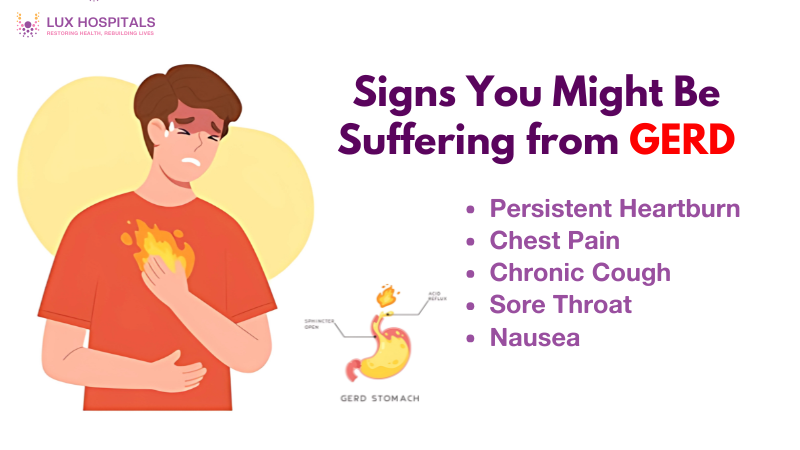Signs You Might Be Suffering from GERD: Don’t Ignore What Your Body Is Telling You

Have you ever felt a burning sensation rising from your chest toward your throat, especially after a heavy meal? Or you may have experienced an unexplained chronic cough, hoarseness, or even difficulty swallowing. These could be more than minor discomforts; they might be GERD signs and symptoms.
Gastroesophageal reflux disease is a chronic gastrointestinal disease where acid from the stomach returns to the esophagus, irritating its lining. While occasional acid reflux is quite normal, persistent symptoms could point to something more serious. In this post, we’ll explore the signs and symptoms of GERD, explore the root causes of GERD, and discuss effective GERD treatment options—helping you spot the problem early and take control of your health.
What Is GERD?
Before we look at the signs of acid reflux, it’s important to understand GERD. The muscle ring known as the lower esophageal sphincter (LES) serves as a valve between the esophagus and stomach, weakens or relaxes improperly, resulting in GERD. This allows stomach acid to move up into the esophagus.
This reflux, also known as acid backwash, may cause symptoms by irritating the lining of your esophagus that can range from minor discomfort to severe disability. Recognizing GERD signs and symptoms early can prevent further complications, such as esophageal damage or Barrett’s esophagus, a precancerous condition.
Common GERD Signs and Symptoms
While everyone may experience reflux differently, specific GERD symptoms are more commonly reported. Here’s what to watch out for:
1. Heartburn
Perhaps the most well-known symptom is heartburn, It frequently occurs after eating or while you’re lying down and feels like a scorching agony in your chest. It can last for several hours and sour taste in your tongue could accompany it.
2. Regurgitation
This refers to the sensation of acid backing up your throat or mouth, leaving a bitter or sour taste. It is one of the classic symptoms of GERD and frequently coexists with heartburn.
3. Chest Pain
This can mimic the pain of a heart attack, making it especially concerning. Unlike heart-related pain, GERD-induced chest pain often occurs after meals and may worsen when bending or lying down.
4. Difficulty Swallowing (Dysphagia)
Over time, acid can cause the esophagus to narrow, leading to problems with swallowing. This is a red flag symptom and should never be ignored.
5. Chronic Cough or Throat Clearing
This often-overlooked symptom is caused by acid irritating the throat. If you constantly cough or clear your throat especially without a cold it may be one of the subtle acid reflux symptoms linked to GERD.
6. Hoarseness or Voice Changes
Acid can affect the vocal cords, leading to a hoarse or raspy voice, especially in the morning. These are commonly confused with respiratory issues, but they’re GERD signs and symptoms in disguise.
7. Sensation of a Lump in the Throat
Many GERD patients describe a feeling like something is stuck in their throat, also known as “globus sensation.”
8. Bad Breath
Chronic exposure to stomach acid in the throat and mouth, even with good oral hygiene, can lead to persistent bad breath.
Less Common But Serious Symptoms of GERD
Some people might experience GERD symptoms that are less typical but equally troubling. These include:
- Nausea or vomiting
- Dental erosion due to acid
- Breathing problems such as asthma or wheezing
- Sleep disturbances
If you experience any of these regularly, it’s time to consider that GERD could be the root cause.
GERD Causes:
Understanding the causes of GERD can help you manage and even prevent it. Here are some of the most common triggers:
1. Dietary Habits
Spicy foods, fried items, chocolate, caffeine, carbonated drinks, alcohol, and citrus fruits trigger acid reflux.
2. Lifestyle Choices
Some of the lifestyle habits that lead to GERD include smoking, obesity, and reclining shortly after eating.
3. Medications
Some medications such as pain medications, antihistamines, sedatives, and calcium channel blockers may relax the LES and raise your risk for reflux.
4. Medical Conditions
Pregnancy, hiatal hernia, and some autoimmune conditions may cause GERD symptoms.
When Should You See a Doctor?
It’s easy to dismiss occasional acid reflux symptoms as no big deal, but persistent discomfort shouldn’t be ignored. If you notice any of the following, seek medical advice:
- Symptoms occurring more than twice a week
- Difficulty swallowing or unexplained weight loss
- Persistent nausea or vomiting
- symptoms that are not addressed by over-the-counter medications
These might be warning signs of complications or other severe conditions that require professional evaluation.
GERD Treatment: What Are Your Options?
Once diagnosed, GERD treatment typically focuses on managing acid production and healing the esophagus. Your doctor may recommend a combination of changes in lifestyle, drugs, or, occasionally, surgery.
1. Lifestyle Modifications
Many people find relief from GERD signs and symptoms by making simple adjustments:
- Eat smaller, more frequent meals
- Avoid food triggers
- After eating, wait two to three hours before you lie down.
- Raise the head of your bed.
- Maintain a healthy weight.
- Quit smoking
2. Medications
Standard acid reflux treatment options include:
- Antacids: Quick relief through neutralization of stomach acid
- H2 Receptor Blockers: Reduce acid production
- Proton Pump Inhibitors (PPIs): More potent blockers of acid production and help heal the esophagus
3. Surgical Options
If medications and lifestyle changes don’t help, surgery may be recommended. Fundoplication is the most popular technique, in which the stomach’s upper portion is circumferentially wrapped around the LES to enhance its strength.
Natural Remedies for Managing GERD
If you prefer a more holistic approach to managing GERD signs and symptoms, consider these natural options:
- Ginger tea: May help soothe the stomach
- Aloe vera juice: Reduces inflammation
- Chewing gum: Increases saliva, which helps neutralize acid
- Licorice root: Helps heal the stomach lining (consult your doctor first)
Remember, natural remedies are supportive, not a replacement for medical care.
Long-Term Risks If GERD Is Left Untreated
Ignoring GERD symptoms can lead to serious complications such as:
- Esophagitis: Inflammation of the esophagus
- Esophageal stricture: Narrowing of the esophagus
- Barrett’s Esophagus: A precancerous condition
- Esophageal cancer
This indicates the importance of treating GERD symptoms and markers promptly and regularly.
Conclusion
Your body is alerting you to a problem when you experience GERD symptoms and signs. Acid reflux is OK on occasion, but if symptoms continue, you cannot ignore them. Understanding the underlying causes of GERD, making some lifestyle changes, and getting on-time treatment for GERD can really enhance your lifestyle.
You don’t have to endure in silence. Regardless of what you do, whether you change your diet, change your sleeping habits, or go to the doctor, relief is only a visit away. If you or someone you know suffers from these symptoms and signs of GERD, get to a healthcare provider and begin your journey towards recovery today.
Frequently Asked Questions
Warning signs of GERD include frequent heartburn, acid reflux, chest pain, difficulty swallowing, chronic cough, and a sore throat.
Yes, GERD can affect daily life by causing discomfort, sleep disturbances, difficulty eating, and reduced productivity due to persistent symptoms like heartburn and acid reflux.
The four stages of GERD are mild, with occasional heartburn; moderate, where heartburn becomes more frequent and the esophagus is irritated; severe, with persistent reflux and possible esophageal damage; and complicated, where chronic GERD leads to severe conditions like Barrett’s esophagus.
To confirm if you have GERD, consult a doctor who may perform tests like endoscopy, pH monitoring, or esophageal manometry to diagnose the condition based on your symptoms and medical history.
GERD cannot be cured entirely, However, it can be successfully controlled with medication, lifestyle modifications, and, in certain situations, surgery to reduce symptoms and avoid consequences.






















